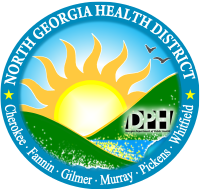- Written by Jennifer King
- Category: Public Service Announcements
For assistance with well-water, septic systems and mold issues related to floods in Gilmer and Pickens Counties, call Gilmer County Environmental Health at 706-635-6050 and Pickens County Environmental Health at 706-253-0900.
- Hits: 4222
- Written by Jennifer King, District Public Information Officer and Risk Communicator
- Category: Public Service Announcements
 If you have dead animals on your property as the result of recent flooding, public health officials recommend that you do the following: If you know the animal owners, contact them and ask that the animals be picked up. If you do not know who owns them, you may bury dead animals on your property under at least two feet of cover and at least 200 feet away from any wells, springs, lakes and streams. Use rubber gloves when handling carcasses and wash your hands using a disinfectant soap. For more information, contact Danny Green with the Georgia Department of Agriculture at 770-535-5955.
If you have dead animals on your property as the result of recent flooding, public health officials recommend that you do the following: If you know the animal owners, contact them and ask that the animals be picked up. If you do not know who owns them, you may bury dead animals on your property under at least two feet of cover and at least 200 feet away from any wells, springs, lakes and streams. Use rubber gloves when handling carcasses and wash your hands using a disinfectant soap. For more information, contact Danny Green with the Georgia Department of Agriculture at 770-535-5955.
- Hits: 4395
- Written by Jennifer King, District Public Information Officer and Risk Communicator
- Category: Public Service Announcements
For all persons involved in floodwater clean-up efforts, public health officials recommend that you make sure you are current on your Tetanus vaccine, which is contained in the Tdap shot (Tetanus, diphtheria and pertussis).
Tetanus is a serious infection caused by bacteria that affects the muscles and nerves. It enters the body through breaks in the skin, such as cuts and puncture wounds. It can lead to “locking” of the jaw so the victim cannot open his mouth or swallow. Tetanus can be fatal.
A Tetanus shot is recommended every 10 years. Protection against tetanus is especially needed if you have worked or are working in flooded areas.
Please be sure to check your immunization history prior to asking for the vaccine, as you may already be protected. You may check with your medical provider, county public health department, workplace employee health service, etc.
For children under age 19, contact your child’s pediatrician.
Pregnant women can be protected against tetanus but should consult with their prenatal healthcare provider prior to receiving the vaccine.
Tetanus vaccine should not be administered to people who have had a severe reaction to the vaccine. This is very rare, and if you are not protected, working on this clean-up effort should be done with caution. The vaccine information sheet (VIS) provides complete information about the vaccine and is available when you get the vaccine.
For more information on tetanus and the Tdap vaccination, log onto CDC’s website at http://www.cdc.gov/vaccines/vpd-vac/tetanus/ or contact your local public health department.
- Hits: 4403
- Written by Andrea Martin, Environmental Health County Manager, Gilmer County Health Department
- Category: Media Releases
Now that the recent flood waters in our area have receded and the most immediate safety hazards have passed, it’s time to address the secondary health issues that can develop as the result of floodwater pollutants.
Be sure to protect your home, family and business by following these easy guidelines from Gilmer County Environmental Health.
CONTACT WITH FLOOD WATERS - Swimming and similar recreational water activities are not advised at this time. Flood waters contain large amounts of contaminants of all kinds. Many thousands of dead chickens have been washed into the streams and rivers. These fast flood waters will carry these contaminants downstream quickly but for now do not have contact with flood waters. Fishing and other non-contact activities are not affected by this advisory.
 SANITIZING FLOODED AREAS – Floors, walls, equipment and furniture that have been covered with flood waters should be cleaned and sanitized to kill any disease bacteria or viruses. Flood waters usually have sewage from over-running sewers and septic systems, manure and other contaminants. Wear gloves, eye protection and boots when working with contaminated areas and items. An easy sanitizing solution is made from a quarter cup of household bleach and one gallon of water. Items should be cleaned with soap and water, rinsed and then sanitized with the bleach solution. This will kill any disease germs and help prevent mold. Do not mix bleach with any ammonia product and work in well-ventilated areas.
SANITIZING FLOODED AREAS – Floors, walls, equipment and furniture that have been covered with flood waters should be cleaned and sanitized to kill any disease bacteria or viruses. Flood waters usually have sewage from over-running sewers and septic systems, manure and other contaminants. Wear gloves, eye protection and boots when working with contaminated areas and items. An easy sanitizing solution is made from a quarter cup of household bleach and one gallon of water. Items should be cleaned with soap and water, rinsed and then sanitized with the bleach solution. This will kill any disease germs and help prevent mold. Do not mix bleach with any ammonia product and work in well-ventilated areas.
- Hits: 4374

